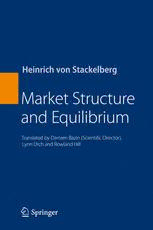
Market Structure and Equilibrium PDF
Preview Market Structure and Equilibrium
Market Structure and Equilibrium . Heinrich von Stackelberg Market Structure and Equilibrium Translated by Damien Bazin (Scientific Director), Lynn Urch and Rowland Hill HeinrichvonStackelberg 1905–1946 ProfessorofEconomics UniversityofBonn Bonn Germany Translators Dr.DamienBazin LynnUrch UniversityofNiceSophiaAntipolis 3RitchiePlace HigherInstituteofEconomicsand WestMoors Management Ferndown DepartmentofHumanScience DorsetBH220LN CampusSaintJeand’Angely UnitedKingdom 24AvenuedesDiablesBleus [email protected] 06300Nice France [email protected] RowlandHill Interlink 2rueGastonDoumergue 85180LeChaˆteaud’Olonne France [email protected] TranslationfromtheGermanlanguageedition: "MarktformundGleichgewicht"byHeinrichvonStackelberg #Springer-VerlagWienNewYork1934,allrightsreserved. ISBN978-3-642-12585-0 e-ISBN978-3-642-12586-7 DOI10.1007/978-3-642-12586-7 SpringerHeidelbergDordrechtLondonNewYork #Springer-VerlagBerlinHeidelberg2011 Thisworkissubjecttocopyright.Allrightsarereserved,whetherthewholeorpartofthematerialis concerned,specificallytherightsoftranslation,reprinting,reuseofillustrations,recitation,broadcasting, reproductiononmicrofilmorinanyotherway,andstorageindatabanks.Duplicationofthispublication orpartsthereofispermittedonlyundertheprovisionsoftheGermanCopyrightLawofSeptember9, 1965,initscurrentversion,andpermissionforusemustalwaysbeobtainedfromSpringer.Violations areliabletoprosecutionundertheGermanCopyrightLaw. Theuseofgeneraldescriptivenames,registerednames,trademarks,etc.inthispublicationdoesnot imply, even in the absence of a specific statement, that such names are exempt from the relevant protectivelawsandregulationsandthereforefreeforgeneraluse. Coverdesign:WMXDesignGmbH,Heidelberg,Germany Printedonacid-freepaper SpringerispartofSpringerScience+BusinessMedia(www.springer.com) Tomywife,Isabelle,withlove. . About the Translators Damien BAZIN, PhD in Economics, is Assistant Professor (Accreditation to Supervise Research) in EconomicsattheUniversityofNiceSophiaAntipolis, France.AfterpostdoctoralstudiesinCanadaandmis- sions in China (program of the European Union), he joined CEMAFI (Center of Macro Dynamic and In- ternational Finance) in 2007 and is now co-director. He conducts research on Macroeconomics and Sus- tainableDevelopment.Hisfieldsofspecializationare many and varied, including Ecology, Ethical and EnvironmentalEconomy,Macroeconomics,Corporate Ethics, and topics related to Socially Sustainable Development. AtpresentheispartofaworkshopoftheCEMAFIwhosemainresearchfieldis socialmacroeconomicsinopeneconomy (employment,unemployment,pensions, disparities, and poverty). He develops projects in the ISEM (Higher Institue of EconomicsandManagement) whosedirectapplications arefound withinecologi- cal economics and game theory. He provides lectures on company ethics in prestigiousParisianbusinessschools.Hislatestworksarerelatedtotheprotection of nature and to economic ethics. He regularly collaborates with national daily paperswiththeaimofpopularizingfundamentalresearch.Homepage:http://www. unice.fr/CEMAFI/ vii viii AbouttheTranslators Lynn Urch is a Qualified Member of the Chartered InstituteofLinguistsandhasaneconomicsbackground. She was educated in translation and modern languages attheUniversityofHullandtheUniversityoftheWest ofEnglandandisafreelancetranslatorofGermanand FrenchintoEnglish. Originally from Northern Ireland, Rowland Hill is aneconomicsgraduatewhohasmanagedasmalltrans- lationandtraining agencyon thewestcoast ofFrance since2002.Beforethathewasheadteacherofaspecial schoolinLondon. Comments On The Translation The idea of translating the work of German economist Heinrich Freiherr von Stackelberg (1905–1946) came to me as I was teaching international economics and economic game theory in a university context. My students constantly con- found the concepts of monopoly, oligopoly (simple, bilateral or contested) and oligopsony, but also the concept of perfect competition. This inability to classify the different markets reappeared when I was teaching abroad. Rather than cast doubt on the aptitudes of my students to understand, I chose to examine my own approachasateacher.Onaskingmylearnedcolleaguesiftheytoohadexperienced this phenomenon in their teaching, it came as no surprise to me when they respondedthatunfortunatelyStackelberg’sfamousmarketclassificationtablewas onlymemorisedbytheirstudentsforalimitedperiod.Itistruethatourmemories are selective and that something learned out of context is not internalised and indeed often quickly forgotten. If we support Nicolas Boileau’s view then, "Whatever we conceive well we express clearly, and words flow with ease" (anextract fromArtpoe´tique).Thisquotecontainsadegreeoftruth.Mystudents did not have the means to assimilate how and why the problems associated with competitionandtheeffectiveorganisationofmarketswereofkeyimportanceand remainvitaltothisday. WhenweundertooktotranslateMarktformundGleichgewichtmyfirstgoalwas tomakethefoundingconceptsofHeinrichFreiherrvonStackelbergmoreaccessi- ble.Suchanaccesswouldhavetostemfromthecontextualisationoftheauthor’s thinking as this would enable us to find the paths he followed and the intrinsic reasonsthatmotivatedhimtopresenthisownparticularviewofmoderneconomics. In a more specific sense, his vision of the world in relation to what influences competition was refined by way of dyopoly (duopoly) models. Stackelberg both revisits the work of the French mathematician-economists Antoine Augustin Cournot and Joseph Louis Franc¸ois Bertrand and provides a perspective on the subject of conjectural interdependence (situational issues involving company leadersandsatellitecompanies). ix x CommentsOnTheTranslation If the intention of this translation project is to highlight one of the cornerstone pieces of work in Economic Science, it has to be added that this book would not have seen the light of day but for the skill and enthusiasm of other professionals who from the outset were willing to participate in the project. I would like to acknowledgetheworkofLynnUrchandRowlandHillwhocollaboratedfullyon thetranslationofthebook.Indeed,thescaleofthework,itsconceptualrichness,the useofveryspecificandtechnicalterms,butinadditionthedifficultyininterpreta- tion led us to work together as an academic team throughout.Their valuable help with the German and the English has more than amply contributed to the success andtothefullnessofthistranslation,whichcouldnothavebeenachievedwithout regular exchange, suggestions and necessary improvements. I would also like to thank Barbara Fess, Dr. Werner A Mu¨ller and Dr. Martina Bihn from Springer PublishingCompanyfortheirconfidence.Naturally,asascienceresearcherIhadto makebothscientificandlinguisticdecisionsinordertopreservethewholenessof the book; I take full responsibility for these choices. By deciding to translate this pivotal text from German to English and hence make it available to many more readers,wehopeinsomesmallwaytobeabletoofferanewinsight. Nevertheless, the reader needs to be aware of the risks involved in translating anywork.Totranslateistounequivocallyacceptthelikelihoodofsubjectivityand hence the risk of a subjective interpretation of the author’s words, even if all attempts have been made to remain as faithful as possible to the original text. Weaimedto"staytrue"totheGermanoneveryoccasionandwherelexicalchoices howeverdidhavetobemadetheyweremadeinordertofacilitatetheeaseofaccess tothebookbythereader.Inaspiritofcandidnesswewishtomakethisclearright fromthestart. Dr.DamienBazin
